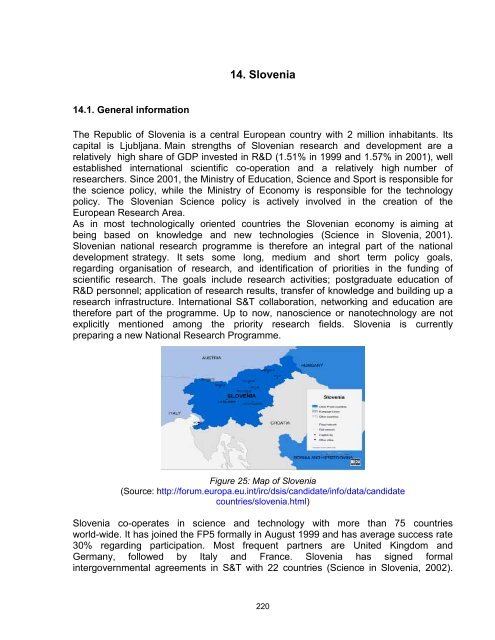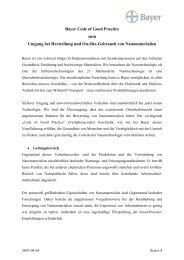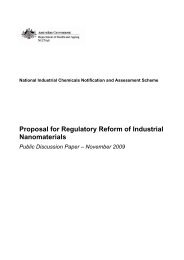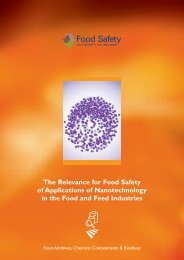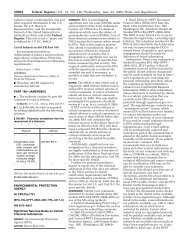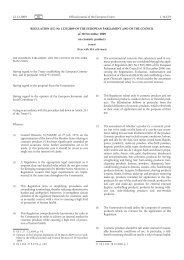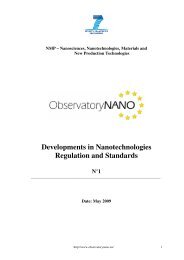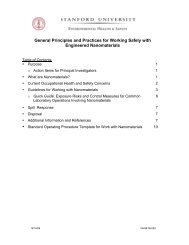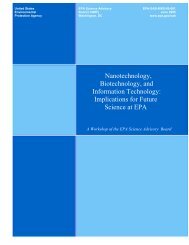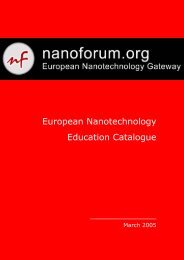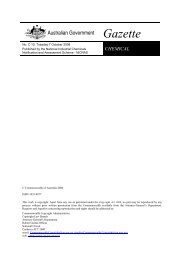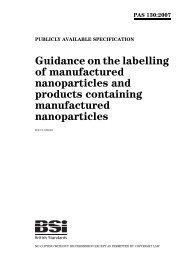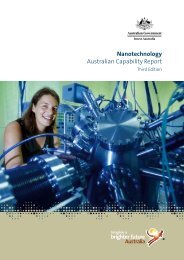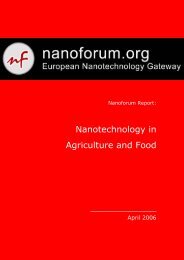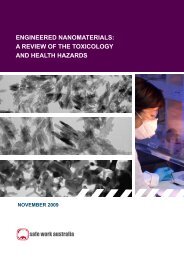- Page 1 and 2:
2 nd Nanoforum Report: NANOTECHNOLO
- Page 3 and 4:
An updated version of the 2 nd Nano
- Page 5 and 6:
7.7. Literature and web-links .....
- Page 7 and 8:
1. Introduction 1.1. General inform
- Page 9 and 10:
Country Total No. Participants Bulg
- Page 11 and 12:
2. EU and nano in the candidate cou
- Page 13 and 14:
Future Generations (CELDIS), at the
- Page 15 and 16:
2.3. Joint Research Centre and the
- Page 17 and 18:
usinesses. Entrepreneurs, investors
- Page 19 and 20:
Nanoforum The European Nanotechnolo
- Page 21 and 22:
2.5 Networks of Excellence supporte
- Page 23 and 24:
2.7. Other European research relate
- Page 25 and 26:
2.8. Literature and web-links Europ
- Page 27 and 28:
Figure 6: Map of Bulgaria (Source:h
- Page 29 and 30:
Integration of reserachers from NCN
- Page 31 and 32:
Description: New materials are deve
- Page 33 and 34:
on the structure and properties; Re
- Page 35 and 36:
and disseminates scientific knowled
- Page 37 and 38:
Address: General Institute Contacts
- Page 39 and 40:
Description: Website: http://www.ip
- Page 41 and 42:
and supporting administrative and t
- Page 43 and 44:
Address: General University Contact
- Page 45 and 46:
3.5. Companies In Bulgaria, there i
- Page 47 and 48:
3.6. Literature and Web-Links Inter
- Page 49 and 50:
4. Cyprus 4.1. General information
- Page 51 and 52:
• The Research Promotion Foundati
- Page 53 and 54:
4.2. Networks Programmes for the mo
- Page 55 and 56:
Contact: ultrafast science, biophys
- Page 57 and 58:
Diogenes Address: General Institute
- Page 59 and 60:
Latest news: publications in scient
- Page 61 and 62:
4.5. FP5 and FP6 collaborations Wit
- Page 63 and 64:
to explore chemical methods of matr
- Page 65 and 66:
http://www.e-nanoscience.com/060302
- Page 67 and 68:
Czech economy and increasing the we
- Page 69 and 70:
5.2. National programmes and projec
- Page 71 and 72:
The Institute of Scientific Instrum
- Page 73 and 74:
Nanotechnology related activities:
- Page 75 and 76:
5.4. Universities Faculty of Scienc
- Page 77 and 78:
Contact: Head of department Prof. J
- Page 79 and 80:
Contact: Vaclav Bouda, Head of Depa
- Page 81 and 82:
Tribology - structure, composition
- Page 83 and 84:
TESCAN, Brno Address: Libusina trid
- Page 85 and 86:
5.6. Literature and web-links MINAT
- Page 87 and 88:
is going to be realised or not will
- Page 89 and 90:
Contact: and developing environment
- Page 91 and 92:
6.3 Universities University of Tart
- Page 93 and 94:
spectroscopy, (AUTOLAB) Photolumine
- Page 95 and 96:
MikroMasch Eesti Ltd, Tallinn Addre
- Page 97 and 98:
6.5. Literature and web-links Resea
- Page 99 and 100:
development programs, on improving
- Page 101 and 102:
7.2. National programmes and projec
- Page 103 and 104:
Hungarian Academy of Sciences Resea
- Page 105 and 106:
Bay Zoltán Foundation for Applied
- Page 107 and 108:
7.4. Universities Eötvös Universi
- Page 109 and 110:
7. 6. FP6 collaborations Networks o
- Page 111 and 112:
8. Latvia 8.1 General Information L
- Page 113 and 114:
8.2. National programmes and projec
- Page 115 and 116:
Materials Physics is participating
- Page 117 and 118:
8.4. Literature and web-links Minis
- Page 119 and 120:
At the moment there is no governmen
- Page 121 and 122:
transmission, business management,
- Page 123 and 124:
• Information technology; • Met
- Page 125 and 126:
• Spectrometers (Perkin Elmer) -
- Page 127 and 128:
Details on the current research act
- Page 129 and 130:
• Spectral properties of molecula
- Page 131 and 132:
physics fluid mechanics and hydroge
- Page 133 and 134:
Details on the project: The role of
- Page 135 and 136:
esolved optical spectroscopy, and R
- Page 137 and 138:
Contact person: Prof. Sigitas Tamul
- Page 139 and 140:
Figure 17: Sample of Nanotehcnology
- Page 141 and 142:
Chemistry Department, Vilnius Unive
- Page 143 and 144:
9.5. Companies AB Rapsolis Address:
- Page 145 and 146:
9.6. Literature and web-links Minis
- Page 147 and 148:
10. Malta 10.1. General information
- Page 149 and 150:
• Foundation for Science and Tech
- Page 151 and 152:
Communitaire. Now, the Institute al
- Page 153 and 154:
Faculty of Science / University of
- Page 155 and 156:
10.5. FP6 collaborations In 1995, M
- Page 157 and 158:
11. Poland 11.1. General informatio
- Page 159 and 160:
11.2. Nanotechnology Research Netwo
- Page 161 and 162:
Centre for Knowledge Based Material
- Page 163 and 164:
and chemical engineering as well as
- Page 165 and 166:
High Pressure Research centre UNIPR
- Page 167 and 168:
Description: Contact: Research focu
- Page 169 and 170: Description: Contact: The research
- Page 171 and 172: 11.7. FP6 collaborations Polish res
- Page 173 and 174: 12. Romania 12.1. General informati
- Page 175 and 176: 12.2. National programmes and proje
- Page 177 and 178: 12.3. The Romanian Consortium for N
- Page 179 and 180: Other researchers: S. Frunza Nanocl
- Page 181 and 182: centre in Romania. Group: Laborator
- Page 183 and 184: iomedical applications. The project
- Page 185 and 186: • Nano/micro-structured magnetorh
- Page 187 and 188: National Institute for Chemical Pha
- Page 189 and 190: 12.5. Universities Faculty of Physi
- Page 191 and 192: 12.6. Companies Samsung Electronics
- Page 193 and 194: 12.8. Literature and Web-Links Mari
- Page 195 and 196: and to make the independent Agency
- Page 197 and 198: 13.2. National programmes and proje
- Page 199 and 200: 13.3. National research networks In
- Page 201 and 202: Contacts: technologies. This resear
- Page 203 and 204: connected with getting raw material
- Page 205 and 206: Acquired results will enrich knowle
- Page 207 and 208: Contacts: GaAs- and InP- structures
- Page 209 and 210: Contacts: deposition of surface coa
- Page 211 and 212: International Laser Centre Address:
- Page 213 and 214: Production and characterisation of
- Page 215 and 216: where the building units are formed
- Page 217 and 218: nanoparticles, advanced techniques
- Page 219: 13.7. Literature and web-links A ce
- Page 223 and 224: 14.3. The research institutes and t
- Page 225 and 226: Description: Contacts: The most Nan
- Page 227 and 228: 14.4. Universities University of Lj
- Page 229 and 230: 14.5. Companies Metal Ravne d.o.o,
- Page 231 and 232: 15. Turkey 15.1. General informatio
- Page 233 and 234: 15.2. National programmes and proje
- Page 235 and 236: 15.3. The Research Institutes and t
- Page 237 and 238: 15.4. Universities Middle East Tech
- Page 239 and 240: Izmir Institute of Technology The C
- Page 241 and 242: Contact: Volkan.Gunay@posta.mam.gov
- Page 243 and 244: 15.6. Literature and web-links A li
- Page 245 and 246: national research programmes. Never
- Page 247 and 248: 247


